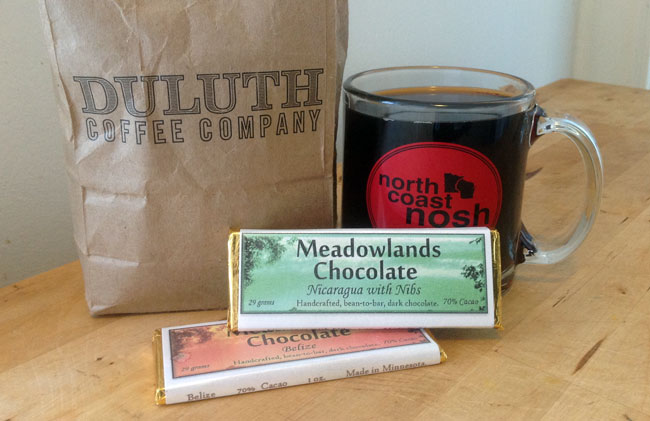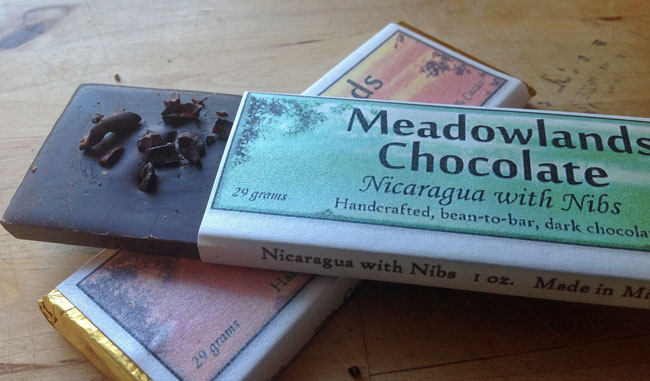
Farm-to-table, grain-to-glass, Grower Champagne — it’s all the same idea. Operations that take on more of a product’s life cycle sacrifice efficiency to ensure a more specific (and, many would say, higher) level of quality. Add one more to the list of local food processes thumbing its nose at vertical integration: bean-to-bar chocolate.
Meadowlands Chocolate Company is one such chocolatier. Based in Meadowlands, MN, it’s the brainchild of Clyo Howard and Beryl Wells Hamilton, two artists with a penchant for hand-crafted products. They’re one of about 40 operations in the US that produce bean-to-bar, and the only one in Minnesota.
“Even our first attempts at this were almost dreamlike, they were so good,” says Howard, who began production last July. “But what could we do to improve it? Let the cacao bean do its thing.” They source whole beans from specific operations in Nicaragua, Belize, the Dominican Republic, and Venezuela, then roast, winnow, grind, conche, temper, and set the chocolate into single-origin bars.
Howard talks about his bean sourcing a lot like a winemaker would talk about terroir. “The land puts so much flavor into the bean,” he says. “People don’t want everything to taste the same. I applaud wineries and microbreweries, because it’s an amazing thing to be surprised by a flavor.”

Meadowlands Chocolate contains only two ingredients: organic cacao and organic cane sugar. That makes it a “dark” chocolate (it’s 70% cacao), but it’s wonderfully smooth and expressive stuff. It lacks that bitter edge many associate with dark chocolate.
“Chocolate needs to melt in your mouth slowly, but not too slowly, and release a full palate of flavors from beginning to aftertaste,” Howard explains. “We did a lot of experimenting. We grind our cacao beans down to 17 microns. And cacao has a lot of acid. So, you do it the Mayan way: conche it, until the acids disappear, but stop the process before you lose flavor.”
Consumers see “fair trade” on food packaging so often, they might associate the term with the same mishmash of vague claims like “reduced fat” and “low sodium.” But chocolate is one product in particular with which we shouldn’t lose the imperative of what fair trade signifies — considering the world’s leading producer is the Cote d’Ivoire, whose cacao industry is notorious for using child slave labor. Meadowlands’ beans are sourced from direct trade with individual farmers. “I don’t want to make it too political,” says Howard, “but I want the farmers to reap the benefits of tending this plant.”
The process of preparing cocoa beans and coffee beans is remarkably similar to begin with. So it’s no surprise that we first encountered Meadowlands Chocolate at Duluth Coffee Company.
“[Meadowlands] saw our company in a similar pursuit: striving to use roasting as a way to highlight the terroir of specific origins,” writes Eric Faust. “Like any craft they are at the beginning of perfecting it, but definitely have a foundation and palate that I believe put them among the finest in their field. I wanted to jump on board right away so that I could be a part of tasting their evolution.” Howard says that evolution will likely include a line of 100% cacao baking chocolates.
They’re not a bargain, at around $3.49 for a one-ounce bar, even compared to some other fair-trade, organic chocolates. But that’s the cost of very small batches from specific locations. Our favorite is the Nicaragua, which has crunchy, roasted cocoa nibs studded in the back of the bar. Find them around in the metro at Tao Natural Foods, Seward Co-op, and Linden Hills Co-op.
Meadowlands Chocolate Company, 10431 Bachelor Square Rd, Meadowlands, MN 55765; 612.708.5046
